Commercial & Corporation Law: Analyzing Contractual Issues & Remedies
VerifiedAdded on 2023/06/04
|7
|1917
|79
Case Study
AI Summary
This case study examines two legal issues arising from a scenario involving Scott and the Federation Arena. The first issue concerns Scott's right to recover $500 for a lost jacket, focusing on the validity of an exclusion clause on a receipt. Applying principles from cases like Chapelton v Barry Urban District Council, the analysis concludes that the clause is invalid, allowing Scott to recover his losses. The second issue addresses whether Scott and his clients can claim damages for discomfort due to disruptions at an event. Referencing cases like Jarvis v Swan Tours and Jackson v Horizon Holidays, the analysis determines that while such claims are possible, they are unlikely to succeed in this instance because the arena's actions were for safety reasons and a full refund was offered. Desklib provides access to similar solved assignments and study resources for students.
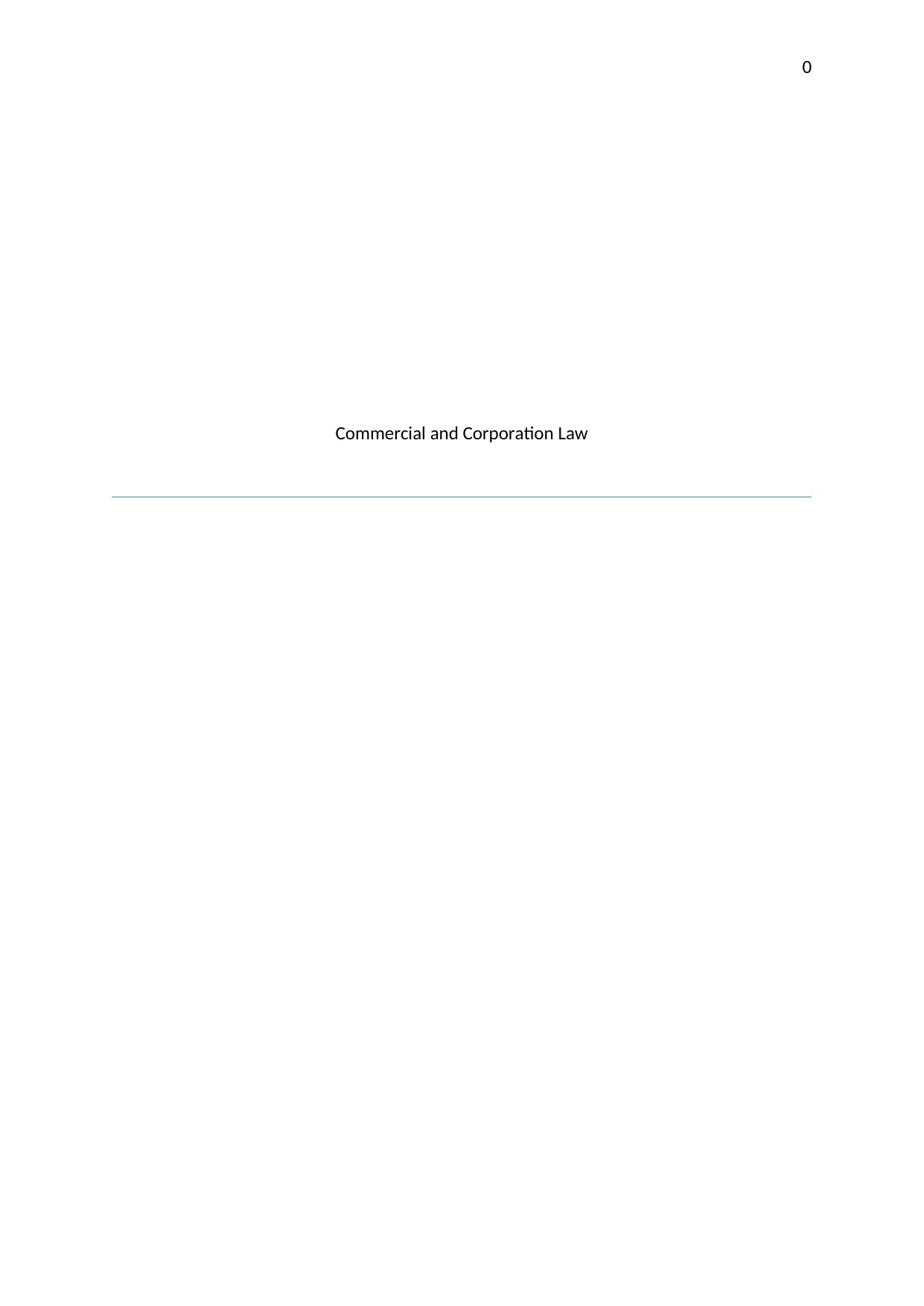
0
Commercial and Corporation Law
Commercial and Corporation Law
Paraphrase This Document
Need a fresh take? Get an instant paraphrase of this document with our AI Paraphraser
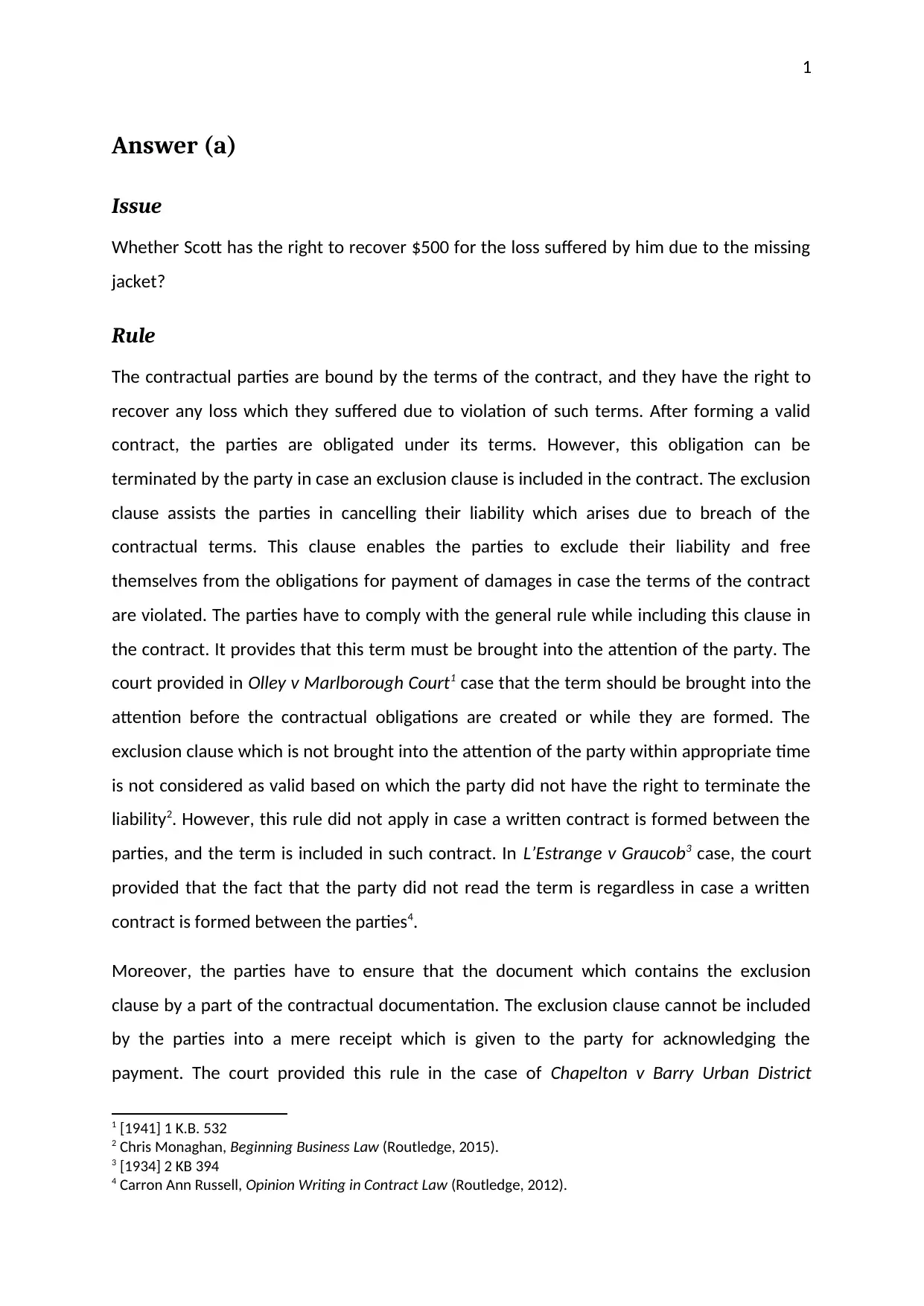
1
Answer (a)
Issue
Whether Scott has the right to recover $500 for the loss suffered by him due to the missing
jacket?
Rule
The contractual parties are bound by the terms of the contract, and they have the right to
recover any loss which they suffered due to violation of such terms. After forming a valid
contract, the parties are obligated under its terms. However, this obligation can be
terminated by the party in case an exclusion clause is included in the contract. The exclusion
clause assists the parties in cancelling their liability which arises due to breach of the
contractual terms. This clause enables the parties to exclude their liability and free
themselves from the obligations for payment of damages in case the terms of the contract
are violated. The parties have to comply with the general rule while including this clause in
the contract. It provides that this term must be brought into the attention of the party. The
court provided in Olley v Marlborough Court1 case that the term should be brought into the
attention before the contractual obligations are created or while they are formed. The
exclusion clause which is not brought into the attention of the party within appropriate time
is not considered as valid based on which the party did not have the right to terminate the
liability2. However, this rule did not apply in case a written contract is formed between the
parties, and the term is included in such contract. In L’Estrange v Graucob3 case, the court
provided that the fact that the party did not read the term is regardless in case a written
contract is formed between the parties4.
Moreover, the parties have to ensure that the document which contains the exclusion
clause by a part of the contractual documentation. The exclusion clause cannot be included
by the parties into a mere receipt which is given to the party for acknowledging the
payment. The court provided this rule in the case of Chapelton v Barry Urban District
1 [1941] 1 K.B. 532
2 Chris Monaghan, Beginning Business Law (Routledge, 2015).
3 [1934] 2 KB 394
4 Carron Ann Russell, Opinion Writing in Contract Law (Routledge, 2012).
Answer (a)
Issue
Whether Scott has the right to recover $500 for the loss suffered by him due to the missing
jacket?
Rule
The contractual parties are bound by the terms of the contract, and they have the right to
recover any loss which they suffered due to violation of such terms. After forming a valid
contract, the parties are obligated under its terms. However, this obligation can be
terminated by the party in case an exclusion clause is included in the contract. The exclusion
clause assists the parties in cancelling their liability which arises due to breach of the
contractual terms. This clause enables the parties to exclude their liability and free
themselves from the obligations for payment of damages in case the terms of the contract
are violated. The parties have to comply with the general rule while including this clause in
the contract. It provides that this term must be brought into the attention of the party. The
court provided in Olley v Marlborough Court1 case that the term should be brought into the
attention before the contractual obligations are created or while they are formed. The
exclusion clause which is not brought into the attention of the party within appropriate time
is not considered as valid based on which the party did not have the right to terminate the
liability2. However, this rule did not apply in case a written contract is formed between the
parties, and the term is included in such contract. In L’Estrange v Graucob3 case, the court
provided that the fact that the party did not read the term is regardless in case a written
contract is formed between the parties4.
Moreover, the parties have to ensure that the document which contains the exclusion
clause by a part of the contractual documentation. The exclusion clause cannot be included
by the parties into a mere receipt which is given to the party for acknowledging the
payment. The court provided this rule in the case of Chapelton v Barry Urban District
1 [1941] 1 K.B. 532
2 Chris Monaghan, Beginning Business Law (Routledge, 2015).
3 [1934] 2 KB 394
4 Carron Ann Russell, Opinion Writing in Contract Law (Routledge, 2012).
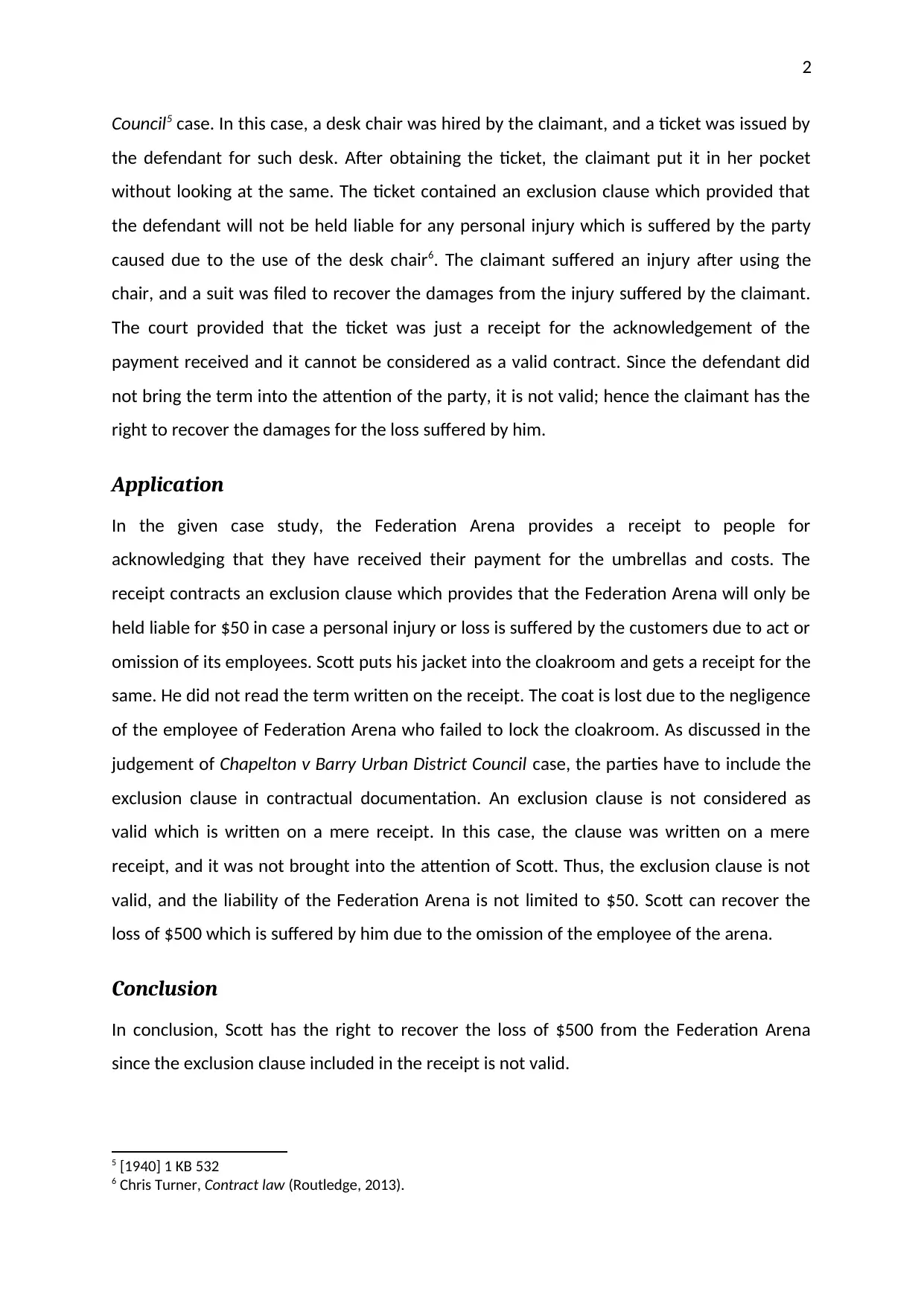
2
Council5 case. In this case, a desk chair was hired by the claimant, and a ticket was issued by
the defendant for such desk. After obtaining the ticket, the claimant put it in her pocket
without looking at the same. The ticket contained an exclusion clause which provided that
the defendant will not be held liable for any personal injury which is suffered by the party
caused due to the use of the desk chair6. The claimant suffered an injury after using the
chair, and a suit was filed to recover the damages from the injury suffered by the claimant.
The court provided that the ticket was just a receipt for the acknowledgement of the
payment received and it cannot be considered as a valid contract. Since the defendant did
not bring the term into the attention of the party, it is not valid; hence the claimant has the
right to recover the damages for the loss suffered by him.
Application
In the given case study, the Federation Arena provides a receipt to people for
acknowledging that they have received their payment for the umbrellas and costs. The
receipt contracts an exclusion clause which provides that the Federation Arena will only be
held liable for $50 in case a personal injury or loss is suffered by the customers due to act or
omission of its employees. Scott puts his jacket into the cloakroom and gets a receipt for the
same. He did not read the term written on the receipt. The coat is lost due to the negligence
of the employee of Federation Arena who failed to lock the cloakroom. As discussed in the
judgement of Chapelton v Barry Urban District Council case, the parties have to include the
exclusion clause in contractual documentation. An exclusion clause is not considered as
valid which is written on a mere receipt. In this case, the clause was written on a mere
receipt, and it was not brought into the attention of Scott. Thus, the exclusion clause is not
valid, and the liability of the Federation Arena is not limited to $50. Scott can recover the
loss of $500 which is suffered by him due to the omission of the employee of the arena.
Conclusion
In conclusion, Scott has the right to recover the loss of $500 from the Federation Arena
since the exclusion clause included in the receipt is not valid.
5 [1940] 1 KB 532
6 Chris Turner, Contract law (Routledge, 2013).
Council5 case. In this case, a desk chair was hired by the claimant, and a ticket was issued by
the defendant for such desk. After obtaining the ticket, the claimant put it in her pocket
without looking at the same. The ticket contained an exclusion clause which provided that
the defendant will not be held liable for any personal injury which is suffered by the party
caused due to the use of the desk chair6. The claimant suffered an injury after using the
chair, and a suit was filed to recover the damages from the injury suffered by the claimant.
The court provided that the ticket was just a receipt for the acknowledgement of the
payment received and it cannot be considered as a valid contract. Since the defendant did
not bring the term into the attention of the party, it is not valid; hence the claimant has the
right to recover the damages for the loss suffered by him.
Application
In the given case study, the Federation Arena provides a receipt to people for
acknowledging that they have received their payment for the umbrellas and costs. The
receipt contracts an exclusion clause which provides that the Federation Arena will only be
held liable for $50 in case a personal injury or loss is suffered by the customers due to act or
omission of its employees. Scott puts his jacket into the cloakroom and gets a receipt for the
same. He did not read the term written on the receipt. The coat is lost due to the negligence
of the employee of Federation Arena who failed to lock the cloakroom. As discussed in the
judgement of Chapelton v Barry Urban District Council case, the parties have to include the
exclusion clause in contractual documentation. An exclusion clause is not considered as
valid which is written on a mere receipt. In this case, the clause was written on a mere
receipt, and it was not brought into the attention of Scott. Thus, the exclusion clause is not
valid, and the liability of the Federation Arena is not limited to $50. Scott can recover the
loss of $500 which is suffered by him due to the omission of the employee of the arena.
Conclusion
In conclusion, Scott has the right to recover the loss of $500 from the Federation Arena
since the exclusion clause included in the receipt is not valid.
5 [1940] 1 KB 532
6 Chris Turner, Contract law (Routledge, 2013).
⊘ This is a preview!⊘
Do you want full access?
Subscribe today to unlock all pages.

Trusted by 1+ million students worldwide
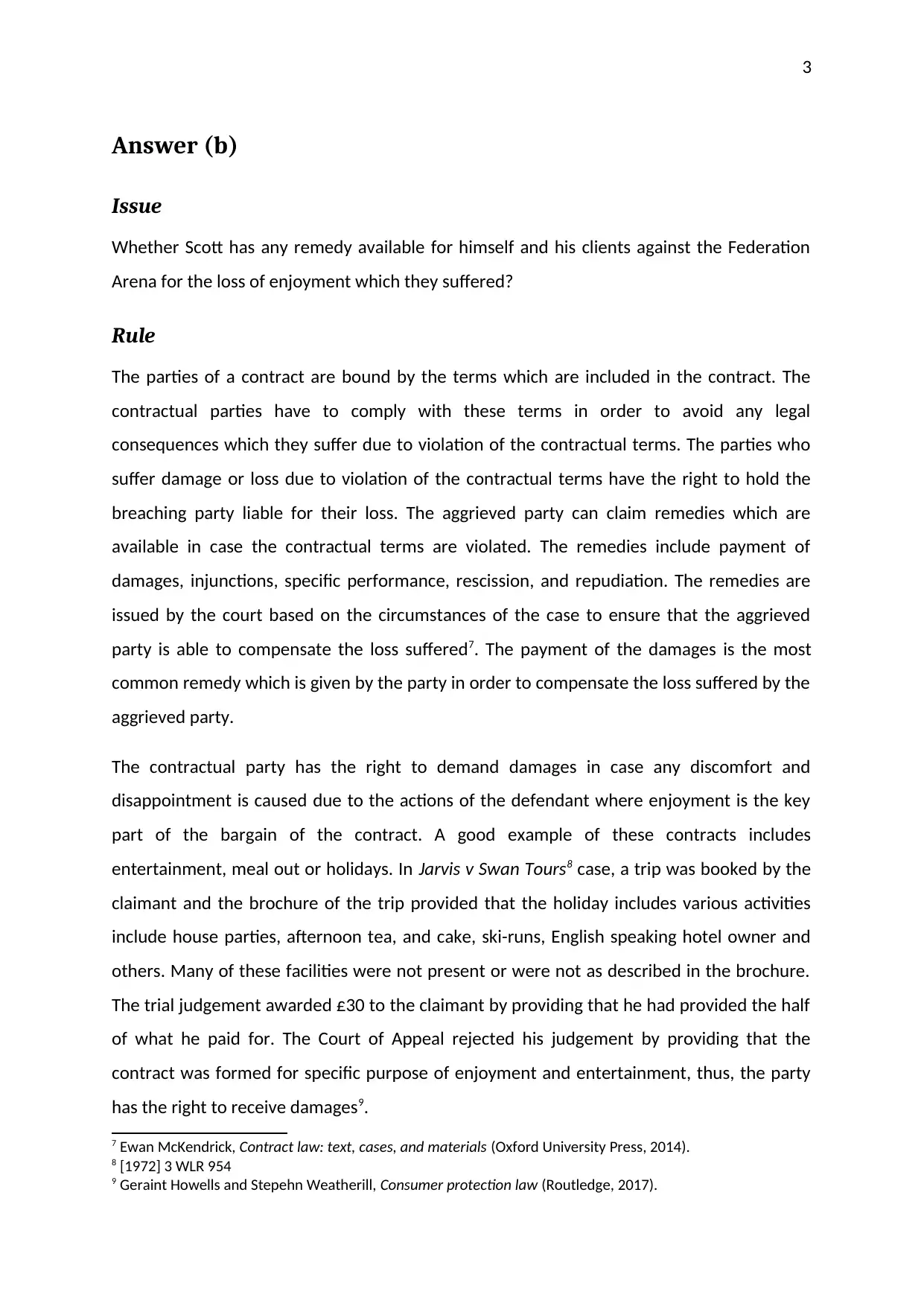
3
Answer (b)
Issue
Whether Scott has any remedy available for himself and his clients against the Federation
Arena for the loss of enjoyment which they suffered?
Rule
The parties of a contract are bound by the terms which are included in the contract. The
contractual parties have to comply with these terms in order to avoid any legal
consequences which they suffer due to violation of the contractual terms. The parties who
suffer damage or loss due to violation of the contractual terms have the right to hold the
breaching party liable for their loss. The aggrieved party can claim remedies which are
available in case the contractual terms are violated. The remedies include payment of
damages, injunctions, specific performance, rescission, and repudiation. The remedies are
issued by the court based on the circumstances of the case to ensure that the aggrieved
party is able to compensate the loss suffered7. The payment of the damages is the most
common remedy which is given by the party in order to compensate the loss suffered by the
aggrieved party.
The contractual party has the right to demand damages in case any discomfort and
disappointment is caused due to the actions of the defendant where enjoyment is the key
part of the bargain of the contract. A good example of these contracts includes
entertainment, meal out or holidays. In Jarvis v Swan Tours8 case, a trip was booked by the
claimant and the brochure of the trip provided that the holiday includes various activities
include house parties, afternoon tea, and cake, ski-runs, English speaking hotel owner and
others. Many of these facilities were not present or were not as described in the brochure.
The trial judgement awarded £30 to the claimant by providing that he had provided the half
of what he paid for. The Court of Appeal rejected his judgement by providing that the
contract was formed for specific purpose of enjoyment and entertainment, thus, the party
has the right to receive damages9.
7 Ewan McKendrick, Contract law: text, cases, and materials (Oxford University Press, 2014).
8 [1972] 3 WLR 954
9 Geraint Howells and Stepehn Weatherill, Consumer protection law (Routledge, 2017).
Answer (b)
Issue
Whether Scott has any remedy available for himself and his clients against the Federation
Arena for the loss of enjoyment which they suffered?
Rule
The parties of a contract are bound by the terms which are included in the contract. The
contractual parties have to comply with these terms in order to avoid any legal
consequences which they suffer due to violation of the contractual terms. The parties who
suffer damage or loss due to violation of the contractual terms have the right to hold the
breaching party liable for their loss. The aggrieved party can claim remedies which are
available in case the contractual terms are violated. The remedies include payment of
damages, injunctions, specific performance, rescission, and repudiation. The remedies are
issued by the court based on the circumstances of the case to ensure that the aggrieved
party is able to compensate the loss suffered7. The payment of the damages is the most
common remedy which is given by the party in order to compensate the loss suffered by the
aggrieved party.
The contractual party has the right to demand damages in case any discomfort and
disappointment is caused due to the actions of the defendant where enjoyment is the key
part of the bargain of the contract. A good example of these contracts includes
entertainment, meal out or holidays. In Jarvis v Swan Tours8 case, a trip was booked by the
claimant and the brochure of the trip provided that the holiday includes various activities
include house parties, afternoon tea, and cake, ski-runs, English speaking hotel owner and
others. Many of these facilities were not present or were not as described in the brochure.
The trial judgement awarded £30 to the claimant by providing that he had provided the half
of what he paid for. The Court of Appeal rejected his judgement by providing that the
contract was formed for specific purpose of enjoyment and entertainment, thus, the party
has the right to receive damages9.
7 Ewan McKendrick, Contract law: text, cases, and materials (Oxford University Press, 2014).
8 [1972] 3 WLR 954
9 Geraint Howells and Stepehn Weatherill, Consumer protection law (Routledge, 2017).
Paraphrase This Document
Need a fresh take? Get an instant paraphrase of this document with our AI Paraphraser
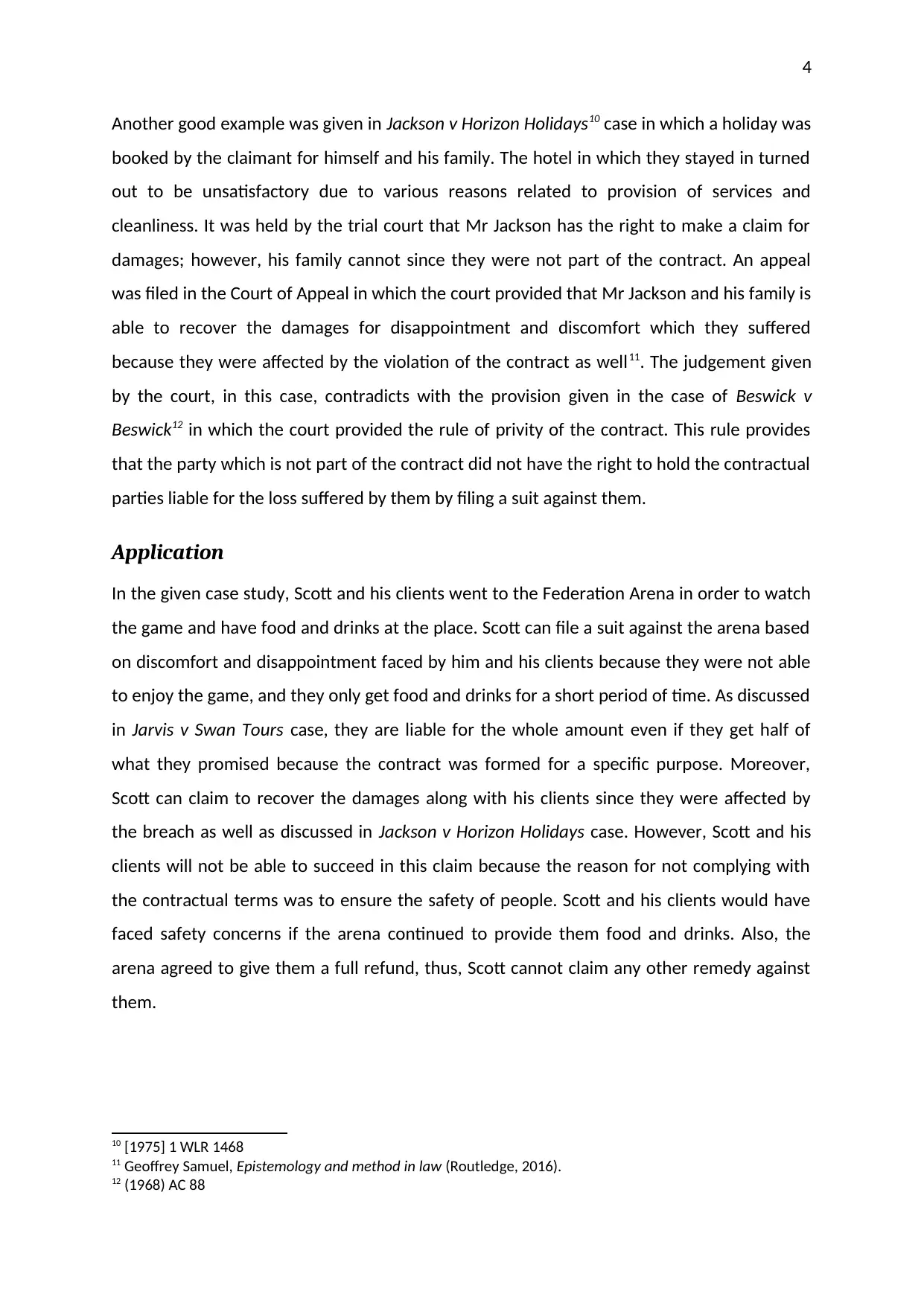
4
Another good example was given in Jackson v Horizon Holidays10 case in which a holiday was
booked by the claimant for himself and his family. The hotel in which they stayed in turned
out to be unsatisfactory due to various reasons related to provision of services and
cleanliness. It was held by the trial court that Mr Jackson has the right to make a claim for
damages; however, his family cannot since they were not part of the contract. An appeal
was filed in the Court of Appeal in which the court provided that Mr Jackson and his family is
able to recover the damages for disappointment and discomfort which they suffered
because they were affected by the violation of the contract as well11. The judgement given
by the court, in this case, contradicts with the provision given in the case of Beswick v
Beswick12 in which the court provided the rule of privity of the contract. This rule provides
that the party which is not part of the contract did not have the right to hold the contractual
parties liable for the loss suffered by them by filing a suit against them.
Application
In the given case study, Scott and his clients went to the Federation Arena in order to watch
the game and have food and drinks at the place. Scott can file a suit against the arena based
on discomfort and disappointment faced by him and his clients because they were not able
to enjoy the game, and they only get food and drinks for a short period of time. As discussed
in Jarvis v Swan Tours case, they are liable for the whole amount even if they get half of
what they promised because the contract was formed for a specific purpose. Moreover,
Scott can claim to recover the damages along with his clients since they were affected by
the breach as well as discussed in Jackson v Horizon Holidays case. However, Scott and his
clients will not be able to succeed in this claim because the reason for not complying with
the contractual terms was to ensure the safety of people. Scott and his clients would have
faced safety concerns if the arena continued to provide them food and drinks. Also, the
arena agreed to give them a full refund, thus, Scott cannot claim any other remedy against
them.
10 [1975] 1 WLR 1468
11 Geoffrey Samuel, Epistemology and method in law (Routledge, 2016).
12 (1968) AC 88
Another good example was given in Jackson v Horizon Holidays10 case in which a holiday was
booked by the claimant for himself and his family. The hotel in which they stayed in turned
out to be unsatisfactory due to various reasons related to provision of services and
cleanliness. It was held by the trial court that Mr Jackson has the right to make a claim for
damages; however, his family cannot since they were not part of the contract. An appeal
was filed in the Court of Appeal in which the court provided that Mr Jackson and his family is
able to recover the damages for disappointment and discomfort which they suffered
because they were affected by the violation of the contract as well11. The judgement given
by the court, in this case, contradicts with the provision given in the case of Beswick v
Beswick12 in which the court provided the rule of privity of the contract. This rule provides
that the party which is not part of the contract did not have the right to hold the contractual
parties liable for the loss suffered by them by filing a suit against them.
Application
In the given case study, Scott and his clients went to the Federation Arena in order to watch
the game and have food and drinks at the place. Scott can file a suit against the arena based
on discomfort and disappointment faced by him and his clients because they were not able
to enjoy the game, and they only get food and drinks for a short period of time. As discussed
in Jarvis v Swan Tours case, they are liable for the whole amount even if they get half of
what they promised because the contract was formed for a specific purpose. Moreover,
Scott can claim to recover the damages along with his clients since they were affected by
the breach as well as discussed in Jackson v Horizon Holidays case. However, Scott and his
clients will not be able to succeed in this claim because the reason for not complying with
the contractual terms was to ensure the safety of people. Scott and his clients would have
faced safety concerns if the arena continued to provide them food and drinks. Also, the
arena agreed to give them a full refund, thus, Scott cannot claim any other remedy against
them.
10 [1975] 1 WLR 1468
11 Geoffrey Samuel, Epistemology and method in law (Routledge, 2016).
12 (1968) AC 88
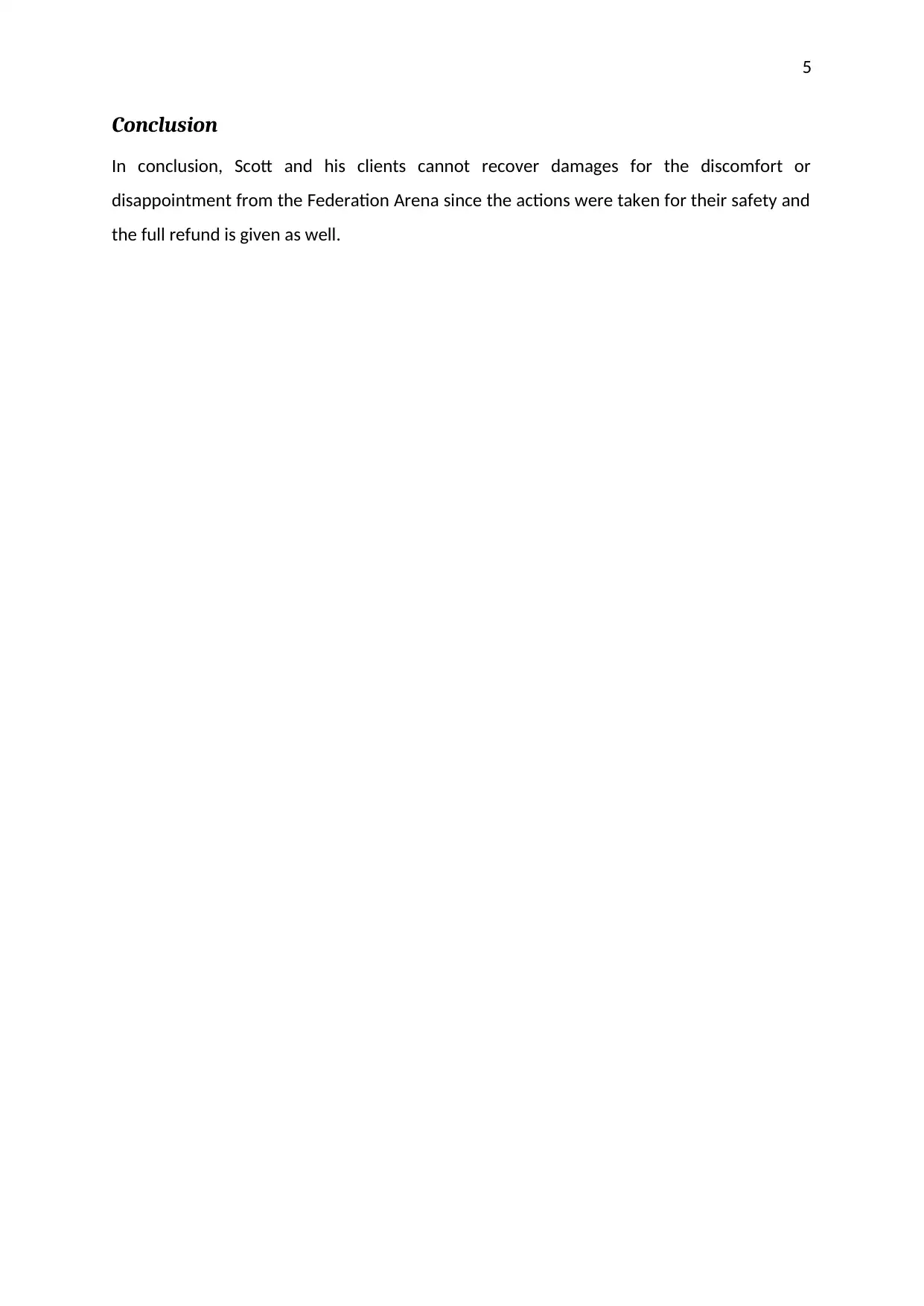
5
Conclusion
In conclusion, Scott and his clients cannot recover damages for the discomfort or
disappointment from the Federation Arena since the actions were taken for their safety and
the full refund is given as well.
Conclusion
In conclusion, Scott and his clients cannot recover damages for the discomfort or
disappointment from the Federation Arena since the actions were taken for their safety and
the full refund is given as well.
⊘ This is a preview!⊘
Do you want full access?
Subscribe today to unlock all pages.

Trusted by 1+ million students worldwide
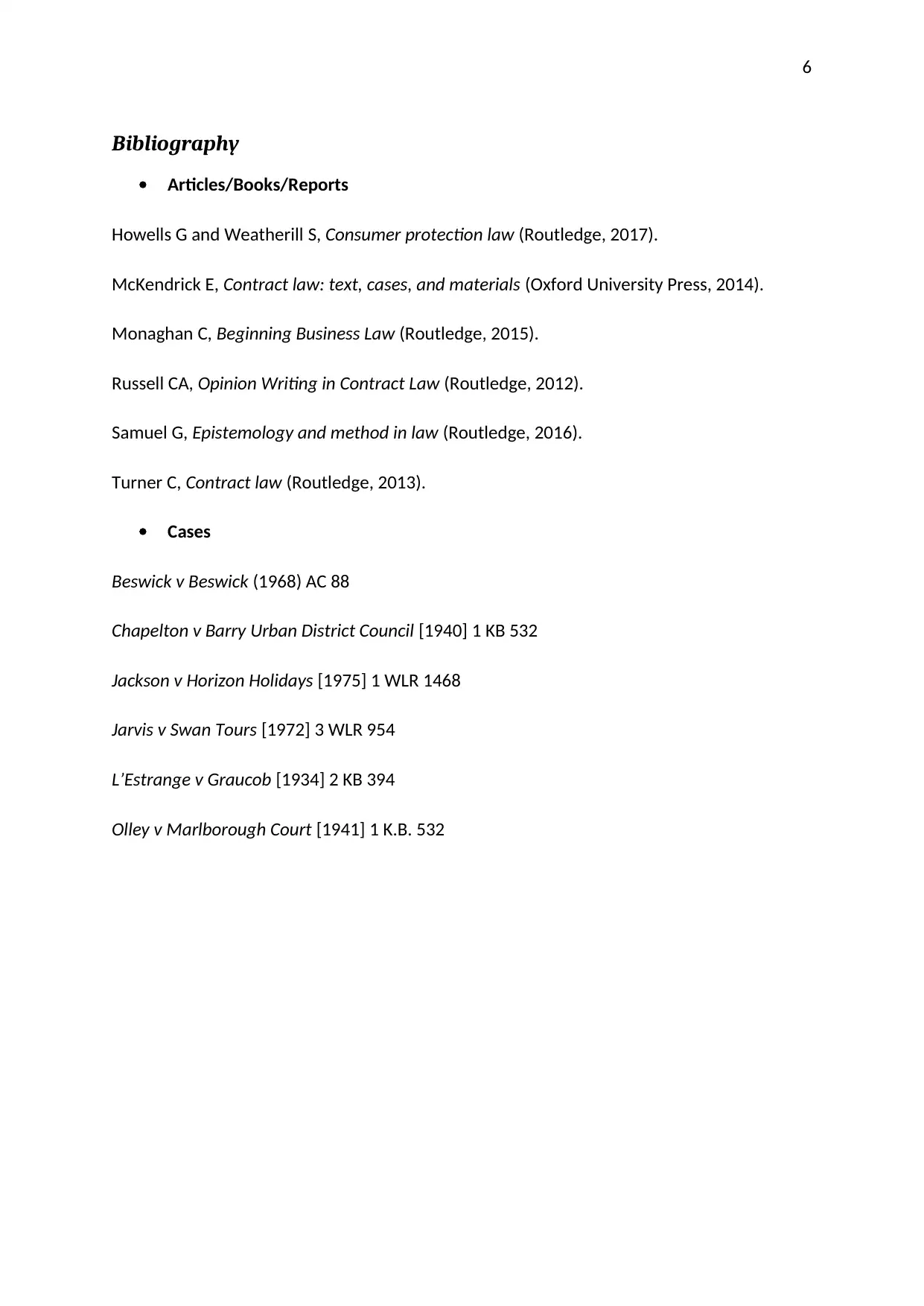
6
Bibliography
Articles/Books/Reports
Howells G and Weatherill S, Consumer protection law (Routledge, 2017).
McKendrick E, Contract law: text, cases, and materials (Oxford University Press, 2014).
Monaghan C, Beginning Business Law (Routledge, 2015).
Russell CA, Opinion Writing in Contract Law (Routledge, 2012).
Samuel G, Epistemology and method in law (Routledge, 2016).
Turner C, Contract law (Routledge, 2013).
Cases
Beswick v Beswick (1968) AC 88
Chapelton v Barry Urban District Council [1940] 1 KB 532
Jackson v Horizon Holidays [1975] 1 WLR 1468
Jarvis v Swan Tours [1972] 3 WLR 954
L’Estrange v Graucob [1934] 2 KB 394
Olley v Marlborough Court [1941] 1 K.B. 532
Bibliography
Articles/Books/Reports
Howells G and Weatherill S, Consumer protection law (Routledge, 2017).
McKendrick E, Contract law: text, cases, and materials (Oxford University Press, 2014).
Monaghan C, Beginning Business Law (Routledge, 2015).
Russell CA, Opinion Writing in Contract Law (Routledge, 2012).
Samuel G, Epistemology and method in law (Routledge, 2016).
Turner C, Contract law (Routledge, 2013).
Cases
Beswick v Beswick (1968) AC 88
Chapelton v Barry Urban District Council [1940] 1 KB 532
Jackson v Horizon Holidays [1975] 1 WLR 1468
Jarvis v Swan Tours [1972] 3 WLR 954
L’Estrange v Graucob [1934] 2 KB 394
Olley v Marlborough Court [1941] 1 K.B. 532
1 out of 7
Related Documents
Your All-in-One AI-Powered Toolkit for Academic Success.
+13062052269
info@desklib.com
Available 24*7 on WhatsApp / Email
![[object Object]](/_next/static/media/star-bottom.7253800d.svg)
Unlock your academic potential
Copyright © 2020–2026 A2Z Services. All Rights Reserved. Developed and managed by ZUCOL.


